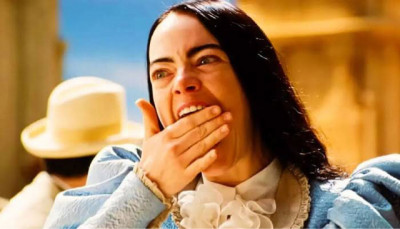In the beginning, “Poor Things” offers much of nothing to its audience. Shot in black and white, its director, Yorgos Lanthimos, draws us into the home of Godwin Baxter (Willem Dafoe). A famous surgeon, Baxter’s house is home to a peculiar person.
Bella Baxter (Emma Stone) is a misbehaving, peculiar and childish woman who is kept within Godwin’s home, away from the influences of the world. Godwin invites Max McCandles (Ramy Youssef), a surgeon studying under Godwin, to track the habits and behaviors of Bella.
McCandles comes to find out that Bella inhabits the body of a woman who killed herself and her mind is that of an infant, an experiment concocted by Godwin to fulfill some twisted scientific fantasy.
After some time passes, Godwin offers Bella’s hand in marriage to McCandles. However, Bella leaves Godwin’s home to go on a grand adventure with Duncan Wedderburn (Marc Ruffalo), a lawyer who’s obsessed with Bella’s infantile behavior.
Bella goes from Lisbon to the open seas, Alexandria to Paris, accompanied by both Duncan and a growing sense of self. This is when “Poor Things” really begins to conform to the veracious reviews.
The black and white shots of Godwin’s home are replaced with saturated landscapes filled with set designs that evoke steampunk architecture. Bella’s childishness, and Emma Stone’s caricature-like acting, is replaced by Bella’s evolving understanding of her emotions and thoughts.
In Lisbon, she gets tastes of freedom as she explores the city. In Alexandria, she begins to feel empathy and sadness towards people. And lastly, in Paris, she undergoes a sexual and enlightened awakening as she works as a sex worker and studies as a medical student.
It seems at the center of the story is Bella’s evolution, her growing love and appreciation of life. However, at the story’s edges, Lanthimos is ruminating on Bella’s agency.
There is the question on whether she should be allowed to do some of these things. While she has the body of an adult woman, her mind is still rooted in youth. Godwin and McCandles often remark on how much her mind has evolved, but how fast can a child’s mind meet its physicality?
This has been a heated conversation that people all across the internet have debated and questioned and fought over. Some see “Poor Things” as a shoddy iteration of “Frankenstein” that romanticizes the sexualization of Bella.
On the other hand, some people don’t think that just because the events and actions in “Poor Things” are immoral and twisted, doesn’t mean they don’t offer some reflection into real themes.
I wholeheartedly agree with this. Because, we spend so much time questioning the validity of fiction, when in reality, it’s fiction. Fiction has been used, and will be used, in order to ask ethical questions and imagine scenarios that can’t be played out in real life.
And isn’t that what “Poor Things” is doing? It’s asking important questions on agency and life in such a surrealist and fantastical lens, making it an interesting, yet necessary, movie that should not be discredited because pieces of it may appear morally wrong.

























